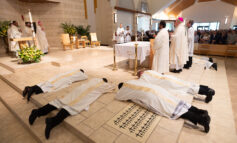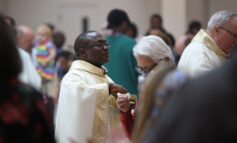
Pope Francis celebrates the canonization Mass for five new saints in St. Peter’s Square at the Vatican Oct. 13, 2019. (CNS photo/Paul Haring)
By Father John Bayer
Special to The Texas Catholic
St. John Henry Cardinal Newman is an ecumenical saint: that is, he is a saint who in a sense belongs to all Christians, inasmuch as his eventual conversion to Catholicism was preceded by other conversions to other Christian traditions, all of which can be seen as representing a progressively deeper discovery of the Gospel. Before Catholicism, there was his conversion to tractarian Anglicanism, and before that there was his youthful conversion to a more Evangelical kind of Christianity at the age of fifteen. Newman, in a sense, thus carries within himself three major Christian traditions, Evangelical Protestantism, Anglicanism and Catholicism, showing how all that is true and good in Protestantism and Anglicanism finds its lasting home in Catholicism.
Newman’s first conversion was to Evangelicalism. This was a move away from what he would later call “liberalism” or a secular religiosity. For Newman, and arguably for us today as well, liberalism is an intellectual culture or attitude that lets drain all the sap of a genuine encounter with Jesus, the living Word of God. It is an “enlightened” form of Christianity that allows modern man to reread the Gospel in such a way that he, essentially, rewrites it, dispensing with all dogma by eliminating whatever does not fit within the categories of the modern world. Against this, Newman discovered the living God, the Lord of history, who is present and who has a design for everyone. God is not just a concept, or an element of an ideology useful for controlling a society. He is the God of Abraham, Isaac and Jacob, the God who is on the move in the world to carry out his will. Our conscience stands, therefore, in relation to God as to a living voice and not to an abstraction that we can modulate as we desire. I think I’ve seen many American Evangelicals enjoying this personal encounter with Jesus. Their readiness, for example, to take the Bible as their final authority can express their confidence in the personal God, and their desire to prefer his ways before any other.
Newman’s second conversion was to tractarian Anglicanism. A deeper understanding of grace, as well as a greater awareness of history, led him to embrace a more sacramental and historical, and thus a more incarnational, Christianity. Consequently, he no longer saw grace in a merely psychological way, or in an emotional way like an “altar call” or “religious experience of being saved”. Now, he saw that God’s grace is operative from our very first moments, like our infant baptism, and that whatever our psychology may be, or however we might appear to ourselves and to others, God’s grace can unfold in our lives like wheat growing together with the weeds (cf. Mt 13:24-30), and that our conformation to Christ is often accomplished in secret, inaccessible ways. This conversion was made with the help of friends, and by an intense study of the Bible and early Church. From his study he saw that Protestantism, by rejecting the Catholic Church, had ultimately rejected authentic aspects of Christianity. At this stage, he felt he could keep the ancient “catholic” faith simply by taking the first theologians of the Church (the “church fathers”) as his authority.
Newman’s third conversion was to Catholicism. This move was prompted by a crisis in tractarian Anglicanism: Is it possible to follow that living voice of God if the highest ecclesial authority is only a library of ancient theologians? What Newman discovered was that the coherence of Christianity presumes a living voice of authority, or a Magisterium capable of echoing the living voice of God. This, at least, was the form of Christianity to be found in the Scriptures and in the early Church, for at no time did the early Church simply default to the letter of an ancient text as its final authority. Rather, the final authority was the Risen Lord, who by his Holy Spirit guides the Church into all truth – and does so still today — through a teacher able to make a judgment. And when Newman looked for “the Church of the living God, the pillar and foundation of truth” (1 Timothy 3:15), the only Christian tradition that appeared to claim such a living voice was the Catholic Church.
Newman’s canonization on Oct. 13 hows that converts to Catholicism have everything to gain and nothing to lose, religiously speaking (Newman suffered tremendous personal and professional loss through the misunderstanding of many family and friends when he converted). Evangelicals need never fear that their personal relationship with Jesus, or their esteem for the Bible, would ever diminish in Catholicism. Anglicans should have every confidence that their desire to be loyal to the ancient catholic tradition can only be enriched and rendered more defensible by trust in the Holy Spirit, who guided that tradition in its beginning and ever after, never leaving the Church but rather protecting its development into “all truth” (Jn 16:13).
Father John Bayer, O.Cist., is a theologian and monk at the Cistercian Abbey of Our Lady of Dallas.



